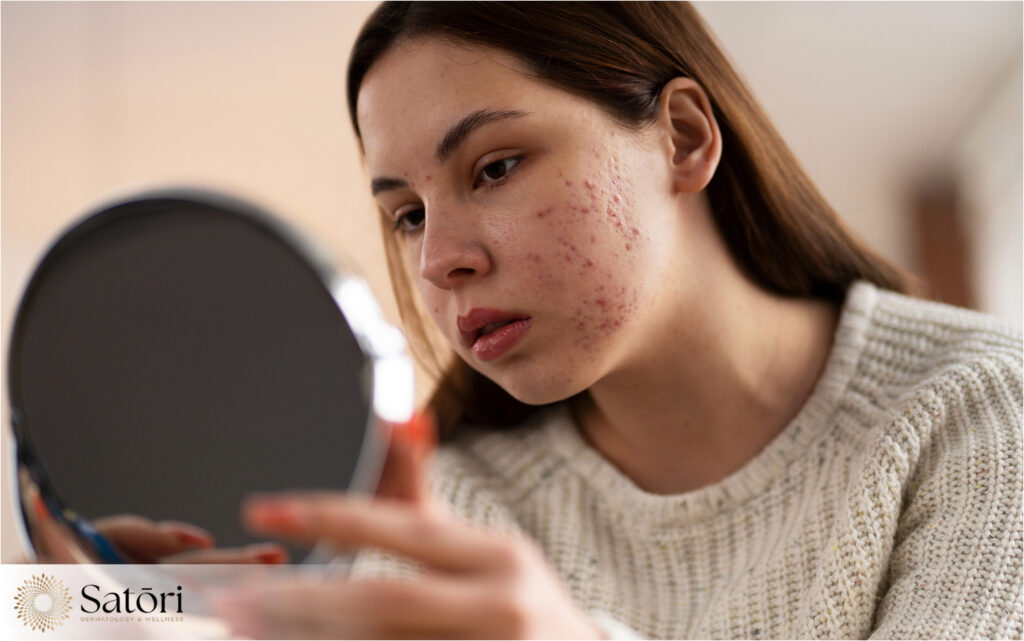For many of us, that morning cup of coffee is non-negotiable. It helps us feel alert and ready to tackle the day. But if you struggle with acne breakouts, you might have heard rumors that your beloved brew could be contributing to your skin concerns.
As dermatologists, we’re frequently asked: “Does coffee cause acne?” The relationship between what we consume and our skin health is complex, and when it comes to coffee, the answer isn’t a simple yes or no.

The Coffee-Acne Connection
Let’s start with some good news for coffee lovers: There isn’t enough evidence to suggest that coffee directly causes acne. However, several components of coffee and how we consume it may indirectly impact our skin health in ways that could potentially trigger or worsen existing acne.
Caffeine itself doesn’t directly cause acne, but it can influence several bodily processes that might affect your skin. When you drink coffee, caffeine stimulates your adrenal glands to produce cortisol, often known as the stress hormone. Heightened cortisol levels can increase oil production in your sebaceous glands, which may contribute to clogged pores and breakouts.
Studies suggest that elevated cortisol levels over time can also accelerate skin aging and potentially make existing acne worse. However, this doesn’t mean everyone who drinks coffee will experience acne breakouts. Your individual response to caffeine and your overall skin type play significant roles in how your skin reacts.

It’s What You Put In Your Coffee That Matters
For many people, the issue isn’t the coffee itself but what they add to it. If you’re loading your cup with dairy milk and sugar, these additions might be more problematic for your skin than the coffee itself.
Dairy’s Impact on Acne
Research increasingly suggests that dairy milk plays a role in triggering acne for some individuals. Cow’s milk contains hormones that can interact with our own hormone levels, potentially stimulating oil production and increasing inflammation in the skin. If you strongly suspect dairy is affecting your skin, consider alternatives like almond or coconut milk in your coffee.
Sugar and Skin Health
That spoonful (or several spoonfuls) of sugar or flavored syrups in your coffee may also be contributing to skin issues. Refined sugar leads to spikes in insulin levels, which can trigger inflammation and increase sebum production. High insulin levels may also enhance the activity of acne-causing bacteria and affect hormone levels that regulate oil production.
When we pair coffee with sweet pastries or processed foods containing trans fats, we’re potentially creating a perfect storm for acne breakouts. These combinations can significantly impact your body’s inflammatory response and potentially make existing acne worse.
Caffeine, Stress, and Your Skin
Another important factor to consider is how caffeine affects your stress levels. For some people, caffeine intake can lead to a heightened stress response, which increases cortisol levels. Stress is a well-known trigger for acne breakouts, creating a cycle that can be difficult to break.
If you notice that your skin tends to flare up during particularly stressful periods, and you also consume significant amounts of caffeine, this connection might be worth exploring. Some individuals find that reducing their caffeine intake helps maintain more balanced hormone levels and, consequently, clearer skin.
That said, moderation is key. There’s typically no need to completely eliminate coffee from your diet unless you’ve worked with a healthcare professional to determine that it’s specifically problematic for your skin.
The Potential Benefits of Coffee for Skin
Interestingly, coffee isn’t all bad news for your skin. Coffee contains antioxidants that can actually benefit skin health by fighting free radicals that contribute to skin aging. Some studies suggest that the antioxidants in coffee might help protect skin cells from damage and potentially reduce inflammation when consumed in moderation.
Even topically, coffee has found its way into skincare products due to these antioxidant properties. However, drinking coffee for its antioxidant benefits doesn’t necessarily offset potential acne triggers if your skin is sensitive to caffeine’s effects.

How to Enjoy Coffee While Maintaining Healthy Skin
If you love coffee but are concerned about its potential impact on your skin, consider these strategies:
- Monitor your reaction: Keep a food diary that tracks your coffee intake and any changes in your skin to identify patterns.
- Consider alternatives: If regular coffee seems problematic, you might try decaf coffee, which contains less caffeine but still provides antioxidant benefits.
- Watch what you add: Instead of dairy milk and sugar, try unsweetened plant-based alternatives like almond milk, which contains beneficial vitamins and nutrients without the potential hormonal effects of cow’s milk.
- Hydrate: Coffee has a mild diuretic effect, which means it can contribute to dehydration. For every cup of coffee you drink, consider drinking an additional glass of water to help maintain skin hydration.
- Limit consumption: If you strongly suspect coffee affects your skin, try reducing your intake to one cup per day, preferably earlier in the day to minimize sleep disruption.
- Choose quality: Opt for high-quality coffee that doesn’t require additions to mask bitter flavors, and avoid coffee drinks that essentially function as desserts due to their high sugar content.
A Balanced Approach to Coffee and Skin Health
While there isn’t conclusive evidence that coffee directly causes acne, its effects on hormones, stress levels, and inflammation may indirectly impact your skin health. The additions to coffee, such as dairy milk and sugar, as well as accompanying foods like pastries, may play a more significant role in triggering acne breakouts than coffee itself.
The key takeaways are balance and personalization. Pay attention to how your skin responds to coffee and make adjustments accordingly. Remember that diet is just one factor in acne development—genetics, hormones, stress, and skincare routines all play important roles as well.
If you’re struggling with persistent acne despite dietary modifications, particularly those tied to your cycle or stress, it may be time to explore effective solutions for hormonal acne in women with a healthcare professional. At Satori Dermatology and Wellness, our team specializes in developing personalized approaches to acne treatment that address all potential contributing factors.

